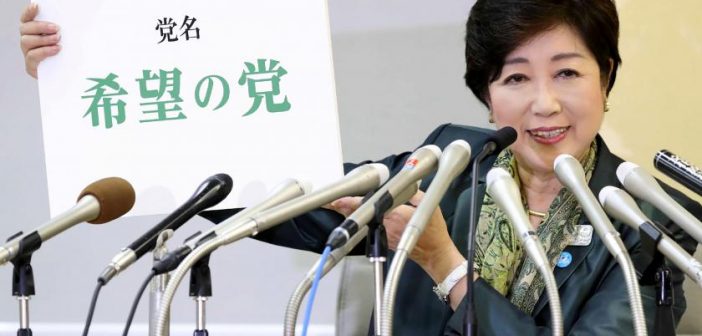Tokyo governor Yuriko Koike annouces the name of new political party ‘Kibo no To (Party of Hope),’ during a press conference in Tokyo last month.
Speculation has rippled across the world over whether or not Yoriko Koike will contest the upcoming General Election against Japanese Prime Minister Shinzo Abe on 22 October.
Whether Koike’s newly-launched Party of Hope is the winning ticket for Japan’s next Prime Minister, the governor of Tokyo has enjoyed the international spotlight. Cities have always set the pace for the future of work, trade and commerce; but Yoriko Koike has ensured that foreign policy and diplomatic affairs are increasingly taking place on a city level now, too.
It is worth noting that the governor of Tokyo, mayor Bill de Blasio of New York, Anne Hildago of Paris and many other city leaders across the world have greater executive powers than city leaders in the UK, and command much more influence throughout the world – both commercially and in terms of international relations.
Foreign policy in the UK is a matter for central Government. Our new metro mayors need to engage much more directly with the UK’s strategic allies and trading partners – and to do this they need to have a greater say over shaping foreign policy.
Britain can’t afford to wait. Paralysis is gripping Whitehall and Westminster, with no majority Government in the House of Commons and the civil service machine sequestered to process the paperwork produced by Brexit.
Manchester and Birmingham are global cities. Foreign direct investment into the regions, in particular the North West, has grown at a higher rate than in London, according to EY analysis published earlier this year.
If our global cities are going to continue this trend against the headwinds of Brexit they need to have the right representation overseas, leading from the front in trade delegations.
India, for example, is proud of its investment in high-tech manufacturing in the West Midlands. And the region’s mayor Andy Street is a former managing director of John Lewis, where an Indian sourcing office comprises a large part of the business’ operations. His role will demand much more engagement with India from him.
Likewise, Manchester’s Chinatown is the third largest in Europe; does Andy Burnham wish to let the Chancellor set the pace of bilateral talks between the Northern Powerhouse and China on his behalf?
Now that we have metro mayors, it is time to use them to offer fairer support for representatives of different political parties on trade missions. The Foreign & Commonwealth Office and Department for International Trade should shed their institutional reticence and wariness of supporting initiatives of those representing other political persuasions.
Nothing changes until something changes. A post-Brexit Britain needs to be flexible and adaptive and question the way things are done.
A new, global Britain should take advantage of diaspora communities and their strength’s in facilitating UK-international relations. The influence that urban diaspora communities have overseas is going to be essential as public servants and government representatives chew over Brexit.
Like the West Midlands, London has a healthy representation from the South Asian diaspora. And with a South Asian mayor and deputy mayor, work is already being done to develop those ties with India and Pakistan.
Sometimes, only policies implemented at a local or regional level will enable the right kind of dialogue with international allies.
Take international student policy. There are over 400,000 international students in the UK, and we have Russell Group universities in every region in the UK. International students are a vital part of our trading terms with partners like India and one of the UK’s greatest forms of influence and soft power in the world.
By loosening restrictions on student mobility, the UK could attract double the number of Indian students we currently have, helping India to boost its skill base and bringing investment into some of the UK’s struggling regions. In 2010, when two-year post-study work visas were still available, numbers of Indian students in the UK were over 39,000; by 2014, they had fallen to 19,750.
Cities like Sheffield, where Oxford Economics found in 2013 that international students add about 14 per cent to the city’s annual income, would reap enormous economic rewards from encouraging international students to stay and work for businesses in the city after they graduate.
The same economic case was put forward by the last chancellor, George Osborne, to devolve business rates to councils and to strike devolution deals with city region jurisdictions. Why can’t it apply to post-study working visas too?
Now is the time to reinvent the role of major cities in international politics – particularly in the UK, where urban economies and their international communities can compensate for Whitehall’s diminishing power.
Back in Tokyo, Yoriko Koike still has a mission to ensure the 2020 Olympic Games are a success, placing Tokyo at the heart of international ceremony. Tokyo’s challenge is to build on the city’s symbolic role on the global stage, harnessing its influence to tackle challenges such as the ageing demographics of the city and its need to bring in greater R&D investment.







